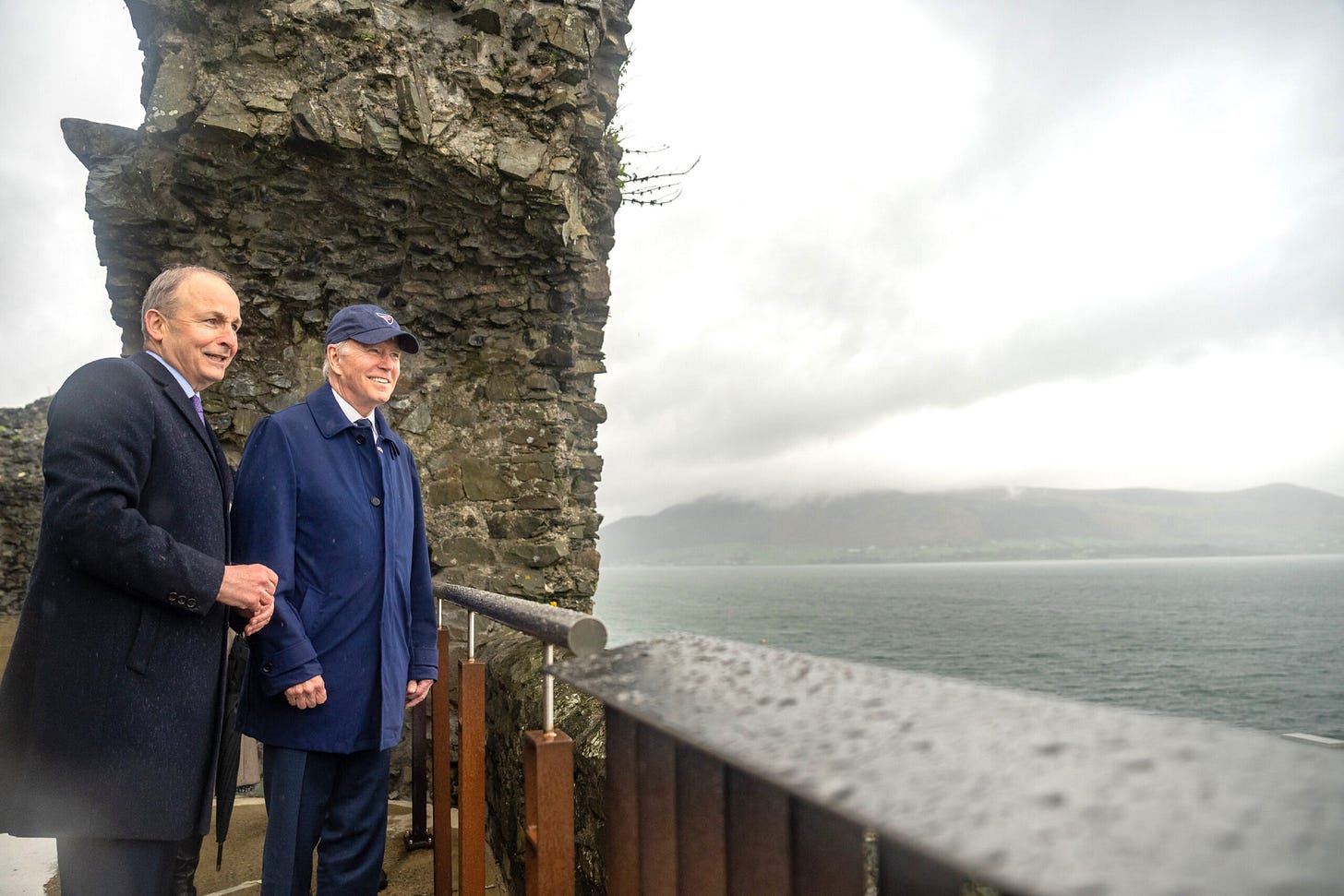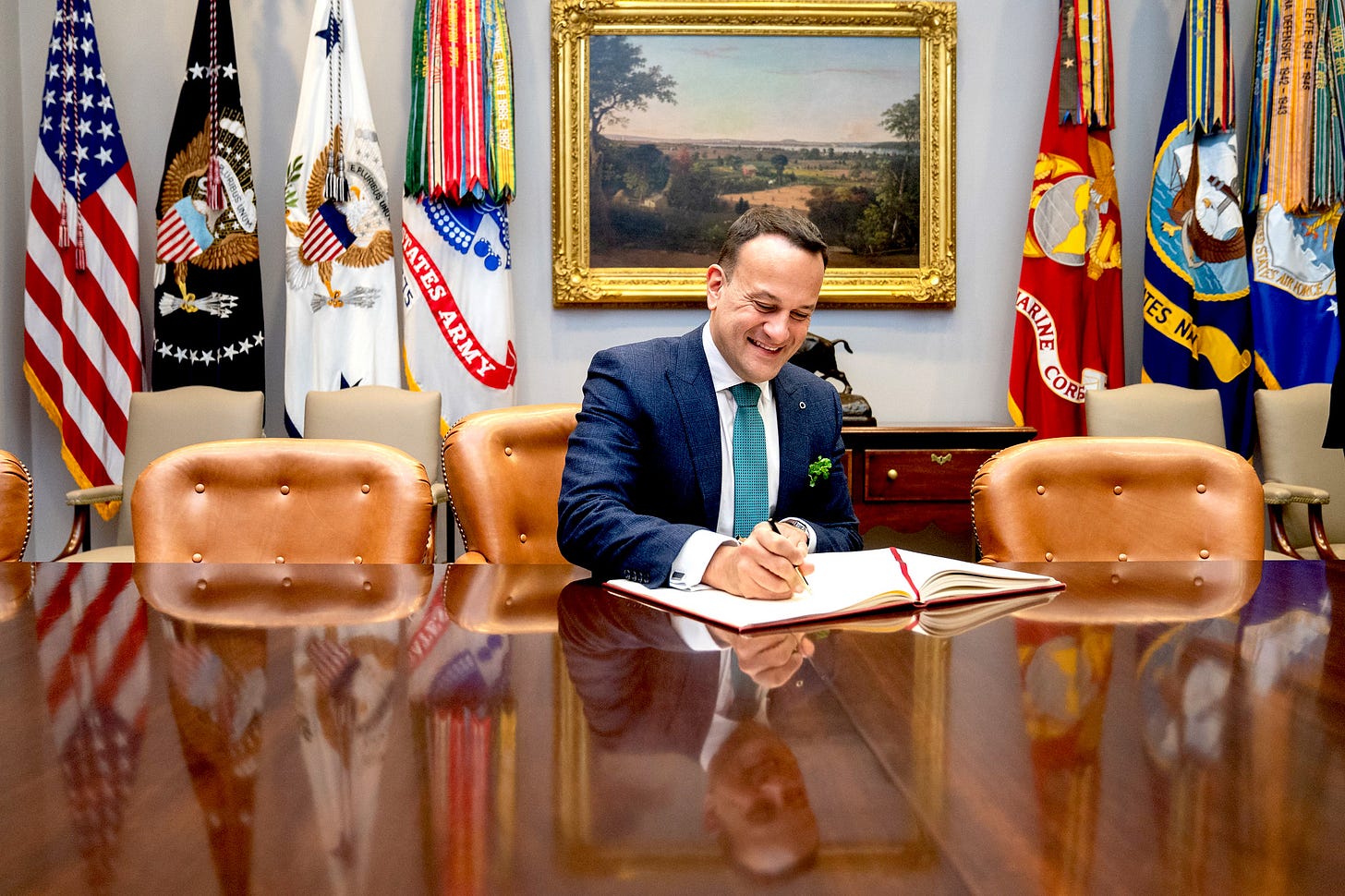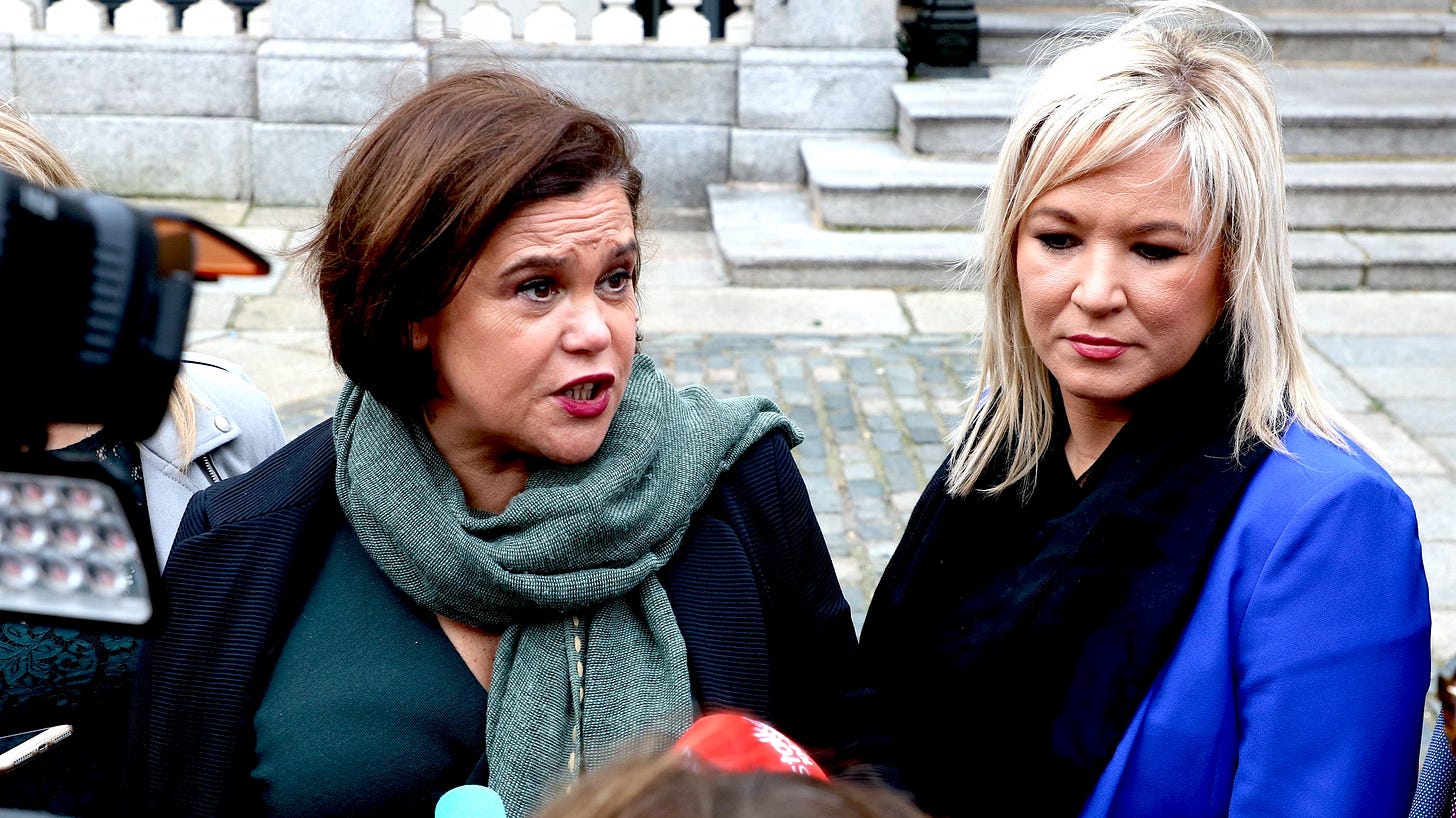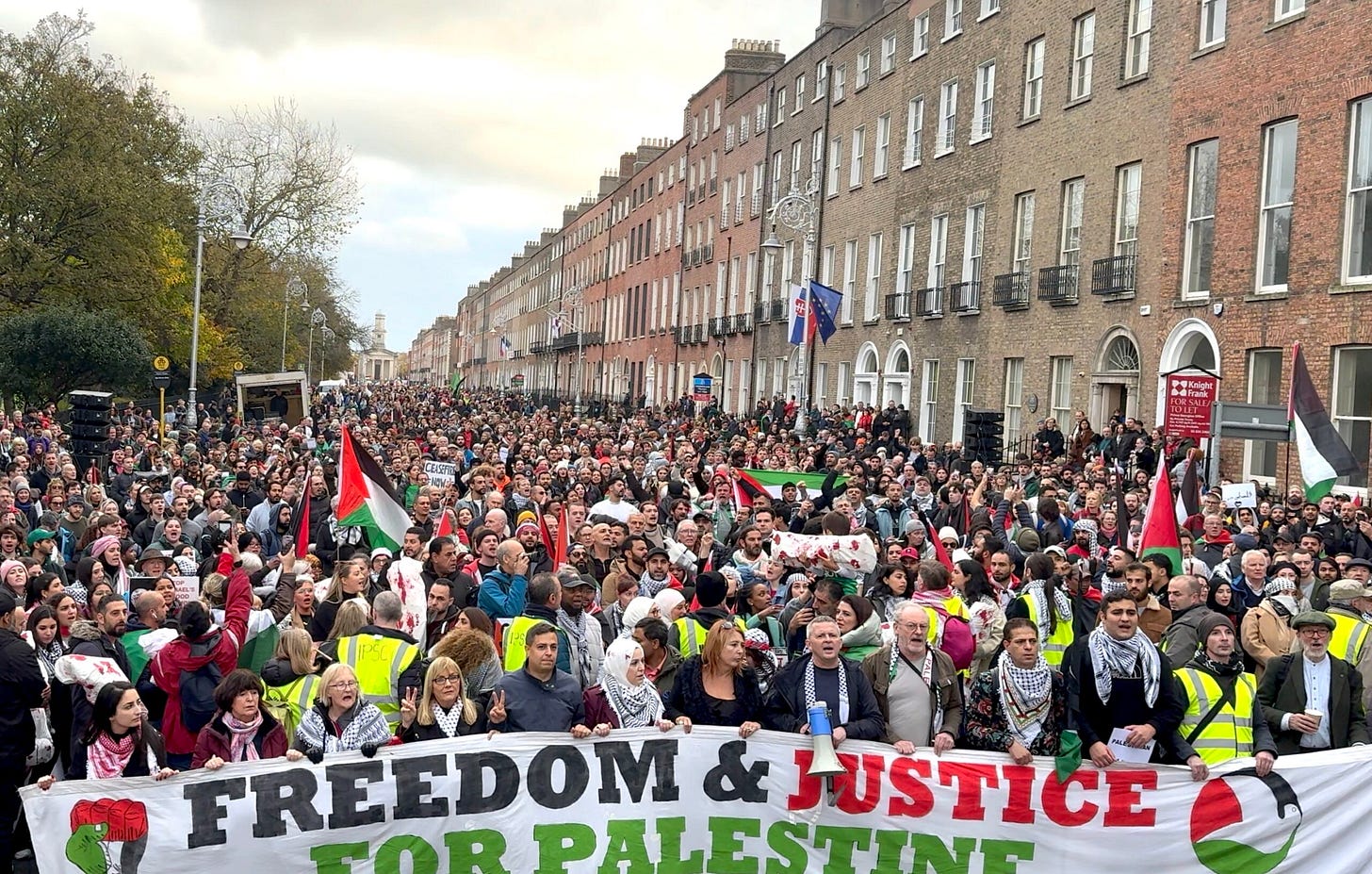Irish Eyes Scowl at Sinn Fein’s St Patrick’s Day With Biden
The party leaders’ decision to visit the White House has provoked intense criticism in a country where support for the Palestinian cause remains the strongest in Europe.
This story for first published by Consortium News
Many Irish eyes have been left scowling over a decision by Sinn Fein to visit US President Joe Biden at the White House to celebrate St Patrick’s Day amid unfolding genocide in Gaza.
The party’s leader Mary Lou McDonald is meeting Biden and his officials alongside her associate, party Vice President Michelle O’Neill at Friday’s festivities (US time), joining Ireland’s Prime Minister Leo Varadkar and Deputy Prime Minister Micheál Martin.
It is a long-held tradition for Irish political, cultural and sporting figures to visit Washington and take part in the diplomatic event, which celebrates the two countries’ historic links.
Over 30 million US citizens claim Irish ancestry, including Biden himself, who traces his roots to counties Louth and Mayo. The event is also a useful photo opportunity for politicians seeking votes on both sides of the Atlantic.
For Sinn Fein it is a further opportunity to cement its image as a mainstream constitutional party able to make pragmatic decisions and be a safe pair of hands as it faces into an election that could see it become the next government of the southern Irish state.
The party, which became the biggest grouping in the Northern Ireland Assembly after an election in 2022 that saw O’Neill installed as its first minister, is currently polling at 28 percent of the vote south of the Irish border and could make another historic gain by leading a new coalition government after elections, scheduled for March 2025.
McDonald and party finance spokesman Pearse Doherty had a two-day stay in New York this month, attending meetings with US businesses operating in Ireland “about future economic growth and opportunity”.
McDonald delivered a keynote address to an Irish Unity Summit in the city’s Cooper Hall on March 1, setting out her vision — an end to the partition of Ireland, which she sees as the democratic outworking of the 1998 Good Friday peace agreement. The agreement included provisions for a future Irish border poll that could enact constitutional change on the island if a majority voted for it.
However, Sinn Fein’s decision to go ahead with its White House visit has provoked intense criticism at home, where support for the Palestinian cause remains the strongest in Europe and where many believe politicians are not doing enough to challenge Israel and its chief supporter, the United States.
Nearly 32,000 Palestinians are now officially recorded as dead, mostly women and children, with Israel’s bombing of Gaza taking on even more ghoulish forms.
As Gazans die from famine caused by Israel’s military siege, IDF tanks and rockets have been targeting crowds of starving people waiting for aid, killing 112 in the ‘flour massacre” south-west of Gaza city on February 29.
With such scenes being replicated regularly and posted on social media as Israel continues its campaign of ethnic cleansing and what the International Court of Justice sees as a plausible case of genocide, tensions have been running high over the White House event.
Popular Irish comedian Tadhg Hickey took to Twitter this week to vent his anger and disappointment. He said:
“I’ve been a Sinn Féin supporter and Irish republican since school. One of the things that attracted me to SF was its internationalism, its solidarity with the oppressed wherever they may be: South Africa, Cuba, Palestine et al. SF says Palestinians will understand the party going to the White House for St Patrick’s Day because we must put our own struggle (Irish unity) first.
“But the simple fact is my friends from Gaza, Hebron & Tulkarm don’t understand. No Palestinian, besides members of the PA, can understand how their ally could shake hands with the sponsors of their ongoing genocide right now…”
Back in January former party leader Gerry Adams articulated the crux of Sinn Fein’s position when he argued Irish America remained an important source of political support that helped to advance its cause. He claimed Palestinians would understand it needed to put its own cause first.
“Serious people involved in struggle… understand that your own struggle, whether it be internationalist, has to be your primary focus,” Adams said.
O’Neill also rejected the idea that not attending would send a stronger message that genocide was taking place in Gaza and it would be inappropriate to meet Biden given his deep complicity in it. She told Irish broadcaster RTE the party would instead raise the issue of Gaza at the White House and push for a ceasefire.
“The US has always been a very strong partner for peace and actually a critical player in achieving our own peace process and I would hope that the US would use that same pragmatism the same approach they took to our peace process and take that to the Middle East,” she said.

O’Neill told Irish media in February that Hamas would eventually be a “partner for peace” in the Middle East and urged peace talks.
However, many would see her characterisation of US peace-making as naïve at best, blithely ignoring that the dynamics of conflict in the Middle East are radically different to the Northern Ireland conflict.
Good Friday Agreement
Sinn Fein successfully galvanised Irish-America to pressure its elected representatives to help it gain entry into peace talks and the political process in the face of a hostile British establishment and an intransigent British unionist population in Northern Ireland who demanded its exclusion and a military solution to the conflict.
The Good Friday Agreement was brokered with the help of the Clinton administration and in particular, Democratic Party Senator George Mitchell, whose “Mitchell Principles” established the basis for peace talks in 1996.
By contrast the US is an apparent partner for war in the Middle East, giving the colonial settler state of Israel diplomatic cover in the UN General Assembly and UN Security Council, as well as billions of dollars in military support over the past five months of Israel’s onslaught in Gaza. Israel has long been a key geo-strategic asset to pursuing US imperial interests in the region.

US officials also understood a peaceful Ireland presented a better environment for US multinationals to operate, their presence bringing more political leverage over any future Irish government.
A report in June 2023 by the American Chamber of Commerce Ireland said 950 American companies now operated in the Republic of Ireland alone, employing 376,000 people.
These facts on the ground were brought to bear on the Irish government after the Occupied Territories Bill (2018) banning trade with and economic support for illegal settlements in Israeli-occupied territories was passed by majorities in both the Seanad (upper house) and the Dáil (lower house). It has been blocked by the current governing party Fine Gael, while Sinn Fein and Fianna Fail have stated they will enact the legislation if in power next year.
After the bill was passed, then Irish Foreign Minister Simon Coveney was warned the vote would mean commercial relations between the US and Ireland taking a hit.
Several politicians from the Irish-American stronghold of Massachusetts, including then Boston Mayor Marty Walsh, said the bill was anti-Semitic. A letter signed by 10 members of Congress warned of “potentially severe implications” to Ireland’s economy.
Some of Sinn Fein’s domestic critics believe the party, well versed in political expediency and compromise of its past radical politics, may succumb to such pressure just as easily as Coveney and his colleagues.
Electoral Tightrope
Having evolved from the political wing of the Provisional IRA, the modern Sinn Fein leadership has always walked an electoral tightrope of keeping its more traditional radical supporters onboard its political programme, while it strategically waters down its socialist and international politics to gain wider appeal as it edges towards entering government.

Irish-Palestinian activist Farrah Koutteineh, head of public relations at the London-based Palestinian Return Centre, believes the party is using the Palestinian cause to garner votes and its St Patrick’s Day Biden visit demonstrates its lack of principle.
She is a former member of the party. A letter sent to her Belfast home in April last year announced her expulsion, which she said did not give a reason. In an opinion piece for The New Arab she put it down to a clash she had with a party convenor at a Palestine Working Group meeting, where she argued the party should update its policy on advocating a two-state solution as it was “void in a settler colonial reality.”
In February, she was ejected from a Sinn Fein public meeting in Belfast with another Palestinian activist after interrupting proceedings to object to the St Patrick’s Day plans and to denounce the presence of the Palestinian Authority representative to Ireland, Dr. Jilan Wahba Abdalmajid, as she was about to address the event.
Abdalmajid is a popular figure in Ireland, particularly within Sinn Fein, who has been invited to various party events to address members and supporters.
Koutteineh says the party’s promotion of PA personalities like Abdalmajid reflects the fact it has sold out its radical past and is lacking with regard to the plight of Palestinians.
The party has a long history with the PLO and other Arab anti-colonial movements. Libya’s Colonel Muammar Gaddafi supplied the IRA with tonnes of modern weaponry and cash for two decades, right up until the late 1980s.
These militant connections may no longer exist for the party and its now defunct military wing, but such links have not fully dissipated in Ireland.
In 2020, British media reported claims of an MI5 agent outed within the Real IRA (RIRA) that the dissident group, which is still operating in Northern Ireland, had cultivated a relationship with Lebanon’s Hezbollah.
Dissidents have also expressed solidarity with the Donetsk and Luhansk People’s republics, flying flags atop lamp posts in housing estates across Northern Ireland where they draw support.
Ireland has maintained a military neutrality policy since its inception in 1921 and has refused to join the US-led NATO military alliance, even though external pressure to change that policy has been building since Russia’s invasion of Ukraine in February 2022.
Sinn Fein has been vocal in its defence of neutrality, yet its critique of the US proxy war in Ukraine aligns strikingly with that of NATO countries, seeing Russia as a colonial, expansionist aggressor and a threat to European nations’ sovereignty. Its position arguably poses a danger of undermining the rationale for keeping a policy that defines a big part of Irish identity. For those like Hickey and Koutteineh, attending Biden’s St Patrick’s Day bash also betrays Ireland’s long tradition of anti-imperialist solidarity.
The party undoubtedly remains the most vocal supporter of Palestinian rights among European parties. It is currently pushing Ireland’s coalition government parties to stop stalling on processing another piece of legislation it introduced before Parliament last year, the Illegal Israeli Settlements Divestment Bill 2023, which prohibits and restricts how Ireland’s Strategic Investment Fund is used.
However, others in Ireland are more direct and uncompromising. The party may have underestimated how unpopular its decision to pose for the cameras with Biden and court America’s power structures would be.
Irish Member of the European Parliament Clare Daly summed up populist sentiment in Ireland when she chastised the US for sending $17.6 billion in military aid to Israel, calling Biden and those blocking aid to starving Gazans “sick monsters”. Referring to Ireland’s own catastrophic colonial-inspired famine in 1847 that saw millions emigrate to the US, she told the EU Parliament in Strasburg on Wednesday:
“As Irish politicians shamefully cross the Atlantic to doff a cap for St Patrick’s Day and pay homage to this butcher, they should remember that our history and relationship to the US comes from our famine. Irish Americans should know the people of Ireland stand against ‘Genocide Joe’. We stand with Palestine. Tiocfaidh ar la (Our day will come).”







The ideas that "charity begins at home" and "we have to put our own struggle first" have some merit, until in the first case you have all the necessities of life, and in the second case you have won back your national sovereignty. Then they just start to look like a justification for selfishness.
The arguments for kowtowing to the US are also hypocritical. The United States is not going to deliver a united Ireland, regardless of whether Sinn Fein bows and scrapes to President Biden. The US profited handsomely from Irish independence, quickly replacing Britain as the major source of investment capital and gathering up a big chunk of Irish trade. Pan-Irish sentiment is all very well, but it is capital in large chunks which determines the relationship between the US and Ireland, a fact which Sinn Fein no doubt understands very well. With both Britain and Ireland firmly in its sphere of influence, the US will not be pushing for a change to the status quo in Northern Ireland, and it will concentrate its efforts on demanding that both nations fully accede to its geopolitical project in the Middle East and elsewhere around the world.
So here we have the curious fact that a generation of Irish republican politicians are quite happy to doff the hat to President Biden, even if it leaves many of their compatriots appalled.
There is another lesson here, which is that the politicians who inherit a new order can be of a very different ilk to those who brought it into being. The United States has had a coloured President, vice-President, Secretary of Defense and Secretary of State who could have been as white as the driven snow for all the difference it made to US policy. New Zealand has had female Prime Ministers, Governors General and Finance Ministers. It has had a swag of gay Cabinet Ministers and Members of Parliament, and none of it has led to a more equal, caring, nurturing society. It has had a Prime Minister who was raised in a state house, graduated to a palatial residence, and seemingly gave little thought to those who now wait forever for a state house, or any kind of house. Those who have benefited from a more open inclusive society will not necessarily follow through by seeking the same opportunities for others.
The various liberation movements of the twentieth century were right about one thing. At the end of the day it is not one's ethnicity, gender, or political affiliation that matters. It is basic moral character. And while we may see that strong moral character in those who truly were in the thick of "the struggle" it is not necessarily present in those who come after to gather up the fruit, those for whom "the struggle" is just a phrase that trips lightly off the tongue.